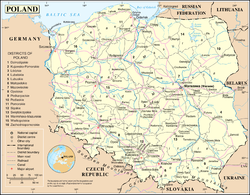Third Republic of Poland
|
Republic of Poland Rzeczpospolita Polska
|
|
|---|---|
|
Anthem:
Poland Is Not Yet Lost |
|
![Location of History of Poland (1989–present) (dark green)– in Europe (green & dark grey)– in the European Union (green) – [Legend]](http://upload.wikimedia.org/wikipedia/commons/thumb/9/9b/EU-Poland.svg/250px-EU-Poland.svg.png)
Location of History of Poland (1989–present) (dark green)
– in Europe (green & dark grey) |
|
 |
|
| Capital and largest city |
Warsaw 52°13′N 21°02′E / 52.217°N 21.033°E |
| Official languages | Polish |
| Regional languages | Kashubian |
| Minority languages | Belarusian, Czech, Lithuanian, German, Slovak, Russian, Ukrainian, Yiddish |
| Ethnic groups (2011) | |
| Demonym | |
| Government | Unitary parliamentary republic |
| Andrzej Duda | |
| Beata Szydło | |
| Legislature | National Assembly |
| Senate | |
| Sejm | |
| Formation | |
| 14 April 966 | |
| 18 April 1025 | |
| 1 July 1569 | |
| 24 October 1795 | |
| 22 July 1807 | |
| 9 June 1815 | |
| 11 November 1918 | |
| 1 September 1939 | |
| 8 April 1945 | |
|
• Republic of Poland
|
13 September 1989 |
| 1 May 2004 | |
| Area | |
|
• Total
|
312,679 km2 (120,726 sq mi) (69th) |
|
• Water (%)
|
3.07 |
| Population | |
|
• 30 June 2016 estimate
|
38,454,576 (34th) |
|
• Density
|
123/km2 (318.6/sq mi) (83rd) |
| GDP (PPP) | 2016 estimate |
|
• Total
|
$1.051 trillion (21st) |
|
• Per capita
|
$27,654 |
| GDP (nominal) | 2016 estimate |
|
• Total
|
$508.857 billion (23rd) |
|
• Per capita
|
$13,390 |
| Gini (2013) |
medium |
| HDI (2014) |
very high · 36th |
| Currency | Złoty (PLN) |
| Time zone | CET (UTC+1) |
|
• Summer (DST)
|
CEST (UTC+2) |
| Drives on the | right |
| Calling code | +48 |
| ISO 3166 code | PL |
| Internet TLD | .pl |
|
Website
www.poland.pl |
|
|
|
– in Europe (green & dark grey)
– in the European Union (green) – [Legend]
In 1989–1991, Poland engaged in a democratic transition which put an end to the People's Republic of Poland and led to the foundation of a democratic government, known as the Third Polish Republic (following the First and Second Polish Republics). After ten years of democratic consolidation, Poland joined NATO in 1999 and the European Union in 2004.
Tension grew between the people of Poland and its communist government, as with the rest of the Eastern bloc as the influence of the Soviet Union faded. With the advent of "perestroika" in the Soviet Union under Mikhail Gorbachev, the opportunity arose to finally change the system of government, after the harsh period of martial law (1981-83) imposed by General Jaruzelski.
Fears that a shift of power from a centralized one-party system to a multi-party democracy might turn into a bloody revolution proved unfounded, owing to the presence on both sides — the Communist Party, and the democratic opposition — of peace-minded reformists committed to a peaceful solution.
The government's inability to forestall Poland's economic decline led to waves of strikes across the country in April, May and August 1988. In an attempt to take control of the situation, the government gave de facto recognition to the Solidarity union, and Interior Minister Czesław Kiszczak began talks with its leader Lech Wałęsa on August 31. These talks broke down in October, but a new series of negotiations, the "round-table" talks, began in February 1989. These talks produced an agreement in April for partly open parliamentary elections. The June election produced a Sejm (lower house), in which one-third of the seats went to communists and one-third went to the two parties which had hitherto been their coalition partners. The remaining one-third of the seats in the Sejm and all those in the Senate were freely contested; the majority of these were by candidates supported by Solidarity. The failure of the communists at the polls produced a political crisis. The round-table agreement called for a communist president, and on July 19, the National Assembly, with the support of a number of Solidarity deputies, elected General Wojciech Jaruzelski to that office. However, two attempts by the communists to form governments failed.
...
Wikipedia


